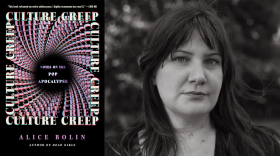This week join us for an encore broadcast of Sarah Aronson’s 2019 conversation with Missoula-based novelist Casey Charles, author of The Monkey Cages (Lethe Press).
In the summer of 1955, sixteen-year-old Tommy Cadigan finds himself helpless in the face of desire, especially when the man that wears the face is his high school swimming coach, a young Korean War veteran who is still recovering from receiving a “blue ticket” discharging him from the military because of his homosexuality. Unsure if his infatuation is returned, Tommy distracts himself with the attention of a local bully, who hustles older men at night besides a decrepit zoo in Boise’s park. Tommy soon finds himself in the midst of a scandal that threatens to ignite the entire town…and his life will never be the same.
Conversation highlights:
Sarah Aronson: Casey, what right do you have to break taboo?
Casey Charles: I have the right to break taboo—I mean anyone has the right to break taboo—but I feel I’m entitled to breaking taboo because of my own sexual orientation. Also bringing that orientation to the University of Montana in 1994 and working on exploring that taboo and expanding its limits for students, faculty, and the community.
Break
Sarah Aronson: In a prior interview with the Missoulian newspaper, you said you wanted to challenge “Who is entitled to tap into the joys of love.” I was really struck by that and wanted to know about your personal connection to either feeling the limitations or limitlessness around love?
Casey Charles: My experience, personally, was in having to overcome a lot of cultural and social expectations. Even though I grew up in the Bay Area, I came from a Catholic family. The odd thing is how ironic it is for someone from the San Francisco Bay Area to come out in the “land of the Castro.” [Laughs] To really come to your own feelings about intimacy, you have to let go of some of the social and cultural expectations. I’m not quite sure how to do that, but that’s the most important thing: to stretch your imagination and allow yourself to feel things without the kind of conventions that keep us from getting in touch with our own imaginations.
Sarah Aronson: Is there a love story connected to your arrival in Montana, whether it be love of place, or study, or person?
Casey Charles: There is, and I’m writing about it right now, actually, because I’m doing a memoir about being HIV positive since the 1990s. I actually acquired HIV in a deeply romantic situation. It was this strange irony, as it were, where you actually contract a deadly virus (which it was then) as a result of this amazing intimacy that I’d never had before. It was my first amazing gay relationship. Which led to my partner finding out he was HIV positive when he went to get his Green Card. I’m writing about that right now. It’s very difficult to do.
Sarah Aronson: In that I hear the limitations and the limitlessness. How love opens you up and also...
Casey Charles: Yeah. I think I’ve always been a romantic. When I was going to Santa Cruz I was reading the Romantic poets and I did have a kind of heterosexual imagination. What I really hope this book will do is not just explore sexuality but explore the idea of romance outside of gender, and that involves letter writing, it involves imagination, it involves desire. It doesn’t always involve action. To open up that space is what I’m hoping to do.
Break
Sarah Aronson: If you were to give permission to our listeners for love, what kind of permission would you give them?
Casey Charles: I would say you need to take risks about how you feel about people. Be ready to be hurt but be ready to speak what you feel and say what you feel about others in ways that may get you into trouble or may end up changing your life. That would be my advice, a lot of it is a about overcoming inhibition for someone that you feel strongly about, even if you already know them.
Life is short, you need to find that and express it in the true idea of “expressing”—pressing out of yourself and making an impression on another. Love is tough but it’s so important. It’s about survival: “I will survive.”
About the Book:
In the summer of 1955, sixteen-year-old Tommy Cadigan finds himself helpless in the face of desire, especially when the man that wears the face is his high school swimming coach, a young Korean War veteran who is still recovering from receiving a “blue ticket” discharging him from the military because of his homosexuality. Unsure if his infatuation is returned, Tommy distracts himself with the attention of a local bully, who hustles older men at night besides a decrepit zoo in Boise’s park. Tommy soon finds himself in the midst of a scandal that threatens to ignite the entire town…and his life will never be the same.
—
The Write Question is a production of Montana Public Radio.





